
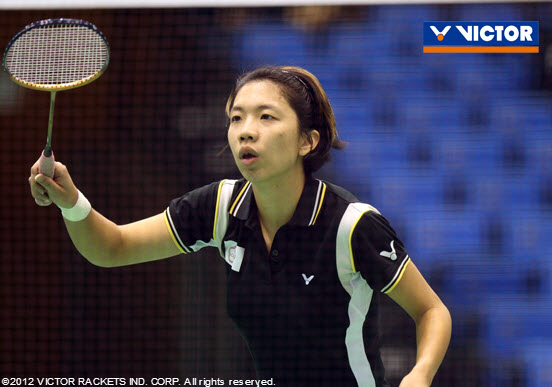
VICTOR STAR : Chinese Taipei’s Cheng Wen Hsing
Using natural talent in the right place
For Cheng Wen Hsing, badminton is a physical memory, it is etched in her mind, is deep in her soul and has an indissoluble connection to her life.
Cheng, currently a teacher in the Department of Athletic Sports of National Chung Cheng University, is one of Taiwan’s famous “golden women’s doubles pair.”
She first came into contact with the sport at age two and, talking of her badminton journey, it is no longer clear if she has been carried by natural talent, hard work, interest or habit. “Playing badminton is a kind of accumulation!
I used my natural talent in the right place, accumulated experience over a long period, received help from many people, have always been inexplicably optimistic and here I am today…..” she laughed as she said how she intends to play until her hair is white.
Badminton is a sport that lets Cheng affirm herself and is a close companion in her life. This predestined relationship has made her take on challenge after challenge and enjoy doing so.
Born into a badminton family, Cheng grew up court-side. The racket she used as a child was a racket with a cut off shaft custom-made for her by VICTOR Chairman Chen Deng-li and VICTOR rackets have been with her through battles big and small ever since.
Cheerful and direct, occasionally revealing her childlike heart, when talking of her badminton beliefs her expression reflected a kind of determination.
“Making choices is something we all have to do in life. My personality is such that if I chose to do something I will do my best. I never think “What if I didn’t play ?” because there no “ifs” in life. All I can do is do my best at what I have chosen.”
On court and off court , a 28 question interview with Cheng Wen Hsing
Q. How old were you when you first began to play and played in your first competition?
A: I was seven years old when I played in my first competition but just two when I picked up a racket and played at the side of the court, and 3-4 when I began playing against 70-80 year old grannies actually on court.
I can’t remember actually learning to play, as long as I can remember I have just known how to play.
Q. When did you play in your first international tournament? Which was your first international title?
A: My first international tournament was in 1996, the World Junior Championships in Denmark when I was 15 and played in the mixed doubles.
I won my first international titles tournament titles when I won the women’s doubles and mixed doubles titles at the World University Badminton Championship in 2002 and then won the same at the 2004 US Open Championship.
Q. What influence did coming from a badminton family have on you?
A: It allowed me to both study and play and take a route different to that of others. My early training was all one on one, and my dad was my coach.
The average coach in Taiwan has to coach 20-30 players so I was lucky in that I received more and better quality coaching than most players receive.
My mother is also a Physical Education teacher so apart from being coached, I also imperceptibly inherited concepts and experience.
Q. When you were young what badminton training methods did your parents use?
A: Although I started playing at a young age my parents didn’t let me use techniques that were beyond by years too much because the power and speed of children is limited;they simply let me have fun, form the correct actions and let them become nerve memories in my brain.
Weight training, smashes, lobs…they were added gradually. Excessive training of kids can result in sports injuries.
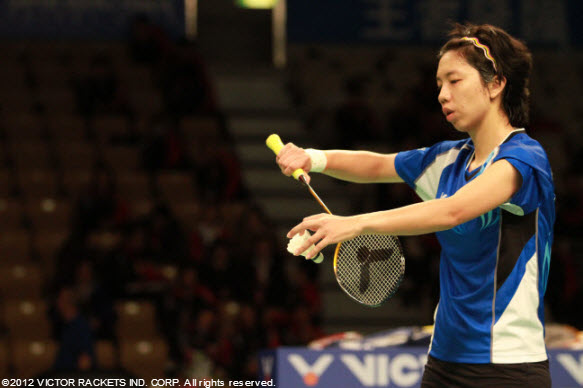
Cheng Wen Hsing preparing to serve
Q. How many hours a day do you practice? Did you have any memorable badminton experiences as a child?
A: On average 3-5 hours a day and 6 if training with the national team. I remember when I was at senior high school getting into arguments with dad about training.
He'd try and hit me with the racket and I’d run away and let him chase me around the court (laughs). When the coach is also your dad sometimes personal emotions get in the way!
Q. What do you habitually do before a match?
A: First I warm up and stretch, then start to talk to myself. I do imagery training by answering questions asked by an imaginary person and I think about what strategy I should use for the game.
If the opponent is a strong one I will encourage myself to be confident while also preparing mentally for the possibility of losing.
Q. You have played many matches. Which is the most memorable?
A: At the Uber Cup in Tokyo in 2006 when Chinese Taipei won third place, its best ever result.
We played Korea in the quarter finals and had lost more than we had won against them in previous matches. We were the fifth match, playing Lee Kyung Won and Lee Hyo-jun.
Chinese Taipei and Korea were 2 matches each all overall and ours was the deciding match. It was a close match that went right to the wire but we came out winners in the end. I was really pleased because this was a historic moment for badminton in Taiwan.
I think the key was that the Koreans were under pressure because they were the favorites while we were less fancied so had less pressure and were able to play without inhibition.
Q. Which performance were you least satisfied with?
A: The 2006 Doha Asian Games! We were all too nervous, from the coaches to the players.
Our women’s doubles pair was ranked third or fourth in the world at the time and many thought that it was a great chance to win Taiwan’s first Asian Game badminton medal, however we didn’t live up to expectations. That was quite a blow to me.
Q. How many Olympics have you taken part in? How does it feel compared to other tournaments?
A: I took part in the 2004 Athens Olympics, my first time, and the 2008 Beijing Olympics.
I was especially excited the first time because all sportsmen and women want to compete at the Olympics and Athens is also the birthplace of the Olympic games so the Athens Games were especially meaningful.
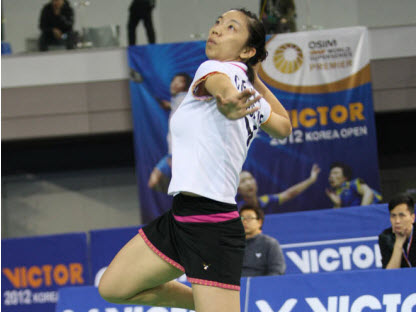
2011 SINGAPORE SUPER SERIES RUNNER-UP : Cheng Wen Hsing
Q. Are you doing any special training or preparation for the 2012 London Olympics?
A: In the year from May 2 2011 to April 30 2012 we took part in successive tournaments trying to accumulate qualifying points and secure a high world ranking to ensure we have a ticket for the London Olympics. These tournaments have been our “training.”
Q. Who is the most formidable player you have ever faced?
A: China’s Gu Jun and Ge Fei are a very powerful pair and won the women’s doubles at the 1996 and 2000 Olympics.
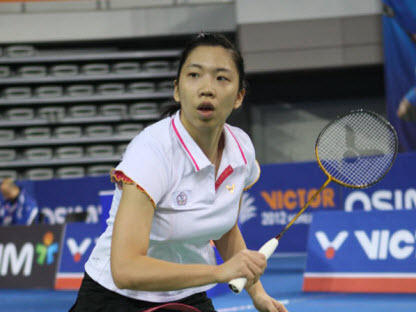
2011 US OPEN GRAND PRIX GOLD RUNNER-UP : Cheng Wen Hsing
Q. What differences are there in role and playing style when you play women’s doubles and mixed doubles?
A: My best position is at the front so it doesn’t matter much if I play women’s doubles or mixed.
The difference is the partner because every player has their own style and I have to adjust to match the playing style of each partner.
Doubles play is a kind of art, the art of bringing your own characteristics as a player into play and also allowing those of your partner to be brought into play.
Taking Chien Yu Chin for example, she is quite strong attacking-wise and my job is to organize and create attacking opportunities for her;Chen Hung Lin and I play in a similar way so we overlap quite a lot in terms of division of later, so I leave some shots to him.
Q. Do you believe winning or losing a game depends on you?
A: The two players in a doubles pair are, of course, both are responsible for winning or losing. If both are playing well results will usually be good.
If one plays well but the other bad then it depends on whether the one playing well can carry the other player. When I play in a doubles game, people usually think winning or losing depends on me because I am the one responsible for organizing and controlling the game.
Q. You have had a long career. How is your style different now to when you were younger?
A: When I was younger I was quite impetuous and wasn’t so good at controlling a match.From 2004 I matured and am now able to control the tempo of the game according to how I feel physically and the game situation on the day.
I also think carefully about the tactics I should use for each different opponent.
Q. Do you care about winning and losing?
A: No one wants to lose! A sportsman or woman has to want to win because if you don’t care about winning or losing you won’t try hard.
When I was young I thought that losing showed that I had a lot of room for improvement and the direction I needed to improve in but these days I think of losing differently.
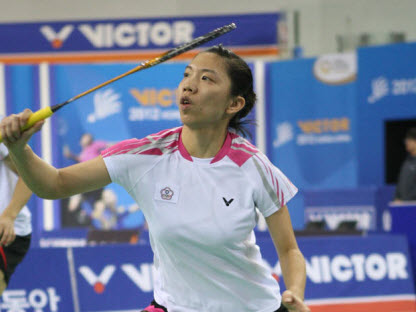
2011 JAPAN SUPER SERIES WINNER:Cheng Wen Hsing
Q. How do you cope with tournament pressure?
A: There are two main factors that allow an athlete to keep improving;one is pressure, the other is nerves.
At one time I felt that I wasn’t making any progress because I didn’t feel any pressure when I was on court. I cope with pre-match pressure by talking to myself.
A particular characteristic of mine is that I actually feel less nervous as soon as I go on court. My coach says when I practice I only deserve a grade of 70% but when I play tournament matches I deserve 110% (laughs)
Q. What were your badminton career plans ?
A: I originally planned to play until I graduated from university, retiring after the 2004 Olympics, going back to school and then doing something different.
However, our doubles pair almost made it to the quarter final stage and my father thought I could still improve; I was only 22 years old at the time, much younger than when most athletes retire.
I also felt a responsibility to society as it wouldn’t be easy for Taiwan to nurture another Top 10 female player if I left the stage….. So I didn’t retire in 2004 and what followed was chaos, now I just take one step at a time (laughs).
Q. You considered quitting the sport in 2006. How did you get over that rough patch?
A: I daren’t just give up so I thought I’d take a rest for three months and see what happened. I even stopped training.
But, I began to feel that my life lacked focus, that there was something I needed to do….. I couldn’t give up the game and was also unwilling to walk away.
I wanted to prove “I can get better” and worked hard to adjust mentally for the challenges when I went into battle on court again.
Q. How do you stay in the best condition ?
A: Everyone ages, we all fall victim to the law of nature, I hope the marks etched on me by time can be converted into wisdom.
Even when I retire I can still play in the Social Section, then Senior Section. Being on court makes me happy.
I’m not the kind of player who trains a lot, my training is aimed at maintaining my current condition and this is why I have lasted so long.
Q. What do you think your badminton strengths or advantages are?
A: I am perceptive on court and I am pretty good at predicting my opponent’s shots. I estimate I am 70% able to predict my opponent’s movement, the state of their shot and where the shuttlecock will land….
The better your ability to predict your opponent’s shots, the better your ability to deal with the shot will be.
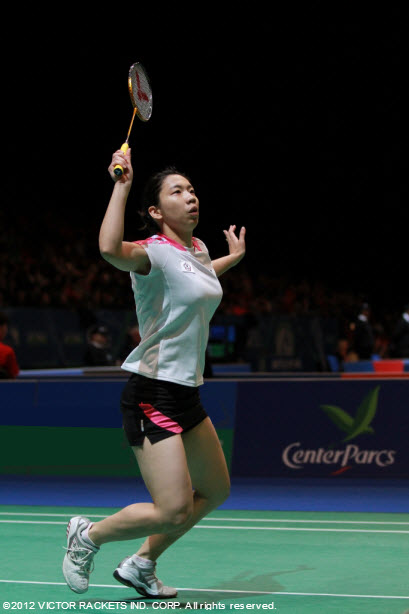
2011 Macau open RUNNER UP : Cheng Wen Hsing
Q. Many people look back proudly on the glory of their youth. What about you?
A: I am very happy to have been able to set many Taiwanese records and I also know that my records will be broken one after the other.
I am very grateful to the male and female players who preceded me, without their results I would have not have had anything to beat.
Competitive sport is a kind of accumulation and a kind of passing on and inheritance. The saying goes “A brave man doesn’t mention his past exploits” but had dad says “Of course a brave man should talk of his past exploits otherwise how would you know about them?” (laughs)
Q. Which badminton player do you admire the most? Why?
A: I really admire Indonesian women’s singles player Susi Susanti. She powerful, is very supple and has an elegant style.
I also admire Danish men’s singles player Morten Frost, who retired at the ripe old age of 31.
From an inexperienced youngster to being crowned “badminton king,” he evolved throughout his career.Watching them play is pleasing to the eye because they have a kind of beauty.
Q. You regularly travel all over the world to play. Which is your favorite country?
A: I like countries with natural scenery in northern Europe like Denmark and Switzerland.
You can feel at ease there but they aren’t too remote. I go to play in Basel, Switzerland every year.
It has many modern buildings but, if you go to the banks of the River Rheine, you can feel the European flavor and it has a real rural tranquility.
Basel’s trams are really convenient and I can travel around the city in my spare time to get a feel of the place and the people.
Q. Ifyou didn’t play badminton professionally what would you do?
A: I love to travel and I’d really like to be a travel show presenter on TV. After retiring I’d like to “wander’ to a strange place, where I’m not known, and not just be a tourist, I’d stay there for a few months so that I get a real understanding of the place.
Q. What other sports do you play? Which sports stars do you admire?
A: I like a lot of sports, including table tennis and tennis. I admire Martina Navratilova.
She loved tennis and was still playing at a high level in her 40s; when she couldn’t play singles she played mixed doubles. She was also a player with her own style.
Q. What, in your view, are the strong points and weak points of your personality?
A: My biggest weakness is that I’m lazy and that’s also my biggest strength because I selectively forget certain things because I am lazy.
Playing badminton is my top priority and, when I am not being lazy, I practice.
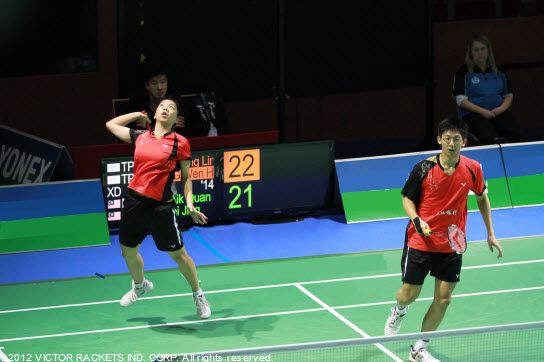
2012 AUSTRALIAN OPEN WINNER : Cheng Wen Hsing
Q. As a teacher and player how is your mentality different?
A: When I play I am quite demanding of myself. When I teach I don’t like to give my students standard answers.
I encourage my students to ask questions but won’t give them a direct answer. I will explain how they can choose to play a smash or a drop shot, for example, and let them decide.
I teach ordinary university students and I hope to make them feel that playing badminton is fun. As a teacher I’m still learning, learning alongside my students, and I hope we grow together.
Q. What advice do you have for young players?
A: I think that “persistence” is hard. If you give up you don’t have to think about where the problem is, overcome obstacles, but, if you persist, the path is indeed a thorny one .
My advice to young players is: "Youth is your capital, don’t be afraid of losing or setbacks, decide firmly what your objectives are and then approach them step by step.
Some people go round in circles, return to where they started and then go forward, but I believe that taking this longer path gives us experiences that help us grow!
Of course, we don’t decide where we actually end up but as long as we make an effort there is nothing to be regretted, and that’s enough.
2012-11-13 |
2012-12-19 |









